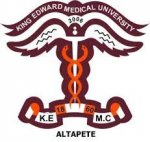Abstract | The relationship between obesity and hypertension has long been recognized. Overweight and obesity are disorders of balance of energy affecting people of various ethnic groups, age and socio–economic statuses. It has been found that obesity is closely associated and correlated with hypertension. Preventive strategies for obesity may offer a cost-effective approach towards lowering blood pressure.
Objectives: To determine the frequency of obesity according to body mass index and waist hip ratio and its relationship with hypertension among medical students.
Methodology: It was a descriptive cross sectional study where a total of 213 students of 1st year MBBS and BDS were involved. Their waist circumference, hip circumference, height and weight were recorded. Moreover, on these subjects bosy mass index (BMI), waist circumference (WC), waist hip ratio (WHR) were calculated and blood pressure was recorded.
Results: Amongst 213 students, a total of 97(45.5%) were male and 116 (54.5%) were females. Among studied subjects, 2 (2.1%) males and 8 (6.9%) females were underweight, whereas 55(56.7%) male and52(44.8%) were of normal weight. The prevalence of overweight in male and females was 17(17.5%) and 22(19.0%), prevalence in obese I in male and female was 20(20.6%) and 23(19.8%), and obese II was 3(3.1%) and 11(9.5%) respectively. Frequency of obesity was found to be more in females than in males according to BMI and WHR. Hypertension was present in 12(30.8%) normal weight students, 6(15.4%) overweight, 14(35.9%) obese I and 7(17.9%) obese II subjects. Correlation between BMI, WC, and WHR was positively significant with SBP and DBP.
Conclusion: High prevalence of overweight and obesity was observed in students. Strong positive correlation of BMI, WC and WHR with systolic and diastolic blood pressures was shown in our study. Results of this study indicate that increase in BMI leads to increase in hypertension.







